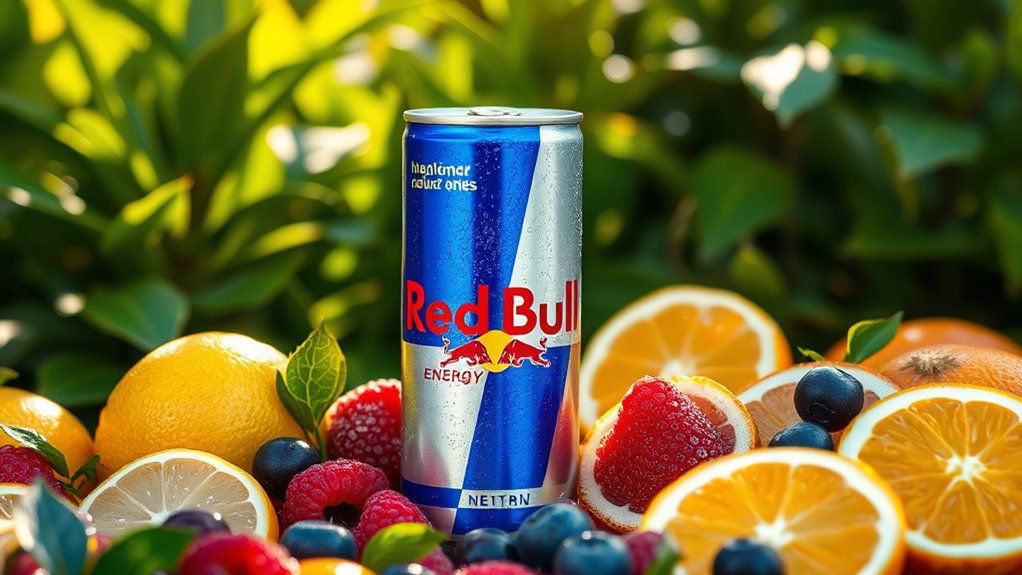
Red Bull packs about 110 calories per 250 ml can, mainly from 27 grams of sugar. It contains 80 mg of caffeine to boost alertness, while crucial B vitamins like B6 and B12 play a role in energy metabolism. Consuming it moderates energy levels but cautious intake is essential to avoid side effects like insomnia or heart palpitations. To understand more about its nutritional profile and alternatives, you might want to explore further.
Red Bull, a popular energy drink, packs a punch with its unique blend of ingredients designed to boost energy and enhance focus. When you crack open a 250 ml can, you're consuming approximately 110 calories, with zero grams of fat and less than one gram of protein. However, the real story lies in the carbohydrate content, where you'll find about 28 grams, mainly from sugar—around 27 grams per serving. This high sugar content is vital to understand, as it can greatly impact your health, contributing to conditions like diabetes and obesity if consumed excessively.
The key ingredients in Red Bull are fundamental to its energy-boosting claims. Each can contains 80 mg of caffeine, a well-known stimulant that helps maintain alertness and can improve cognitive performance. The presence of taurine, an amino acid, supports cardiovascular function, though its effects in conjunction with caffeine warrant further research. Additionally, Red Bull is enriched with vitamins B6 and B12, which play essential roles in energy metabolism.
Red Bull's key ingredients, including caffeine and taurine, enhance alertness and cognitive performance while supporting cardiovascular function.
Red Bull also boasts a variety of B-group vitamins, including Niacin (B3), Pantothenic Acid (B5), Vitamin B6, and Vitamin B12, with impressive percentages of daily recommended intake: 100% for Niacin, 250% for B6, and 80% for B12. While these vitamins can help with energy metabolism, be cautious; excessive intake could lead to potential overload.
The sugar in Red Bull provides immediate energy, delivering a quick boost when you need it. However, as you know, this can lead to a rapid increase in blood sugar levels, which mightn't be ideal for everyone, particularly those sensitive to sugar. The caffeine works to sustain alertness over a longer period, enhancing both mental and physical performance. Many consumers find that this combination helps improve reaction time, endurance, and overall focus.
If you're considering alternatives, Red Bull also offers sugar-free versions that utilize artificial sweeteners like Aspartame and Acesulfame K. These options have considerably fewer calories while maintaining similar levels of vitamins and minerals. However, the long-term effects of these sweeteners remain debated, making it essential to weigh your options carefully.
Moderation is important when consuming Red Bull. Excessive intake can lead to adverse effects such as nervousness, insomnia, and heart palpitations due to the caffeine. It's wise to be aware of your overall daily caffeine consumption, especially if you consume other caffeinated products.
Additionally, keep an eye on the ingredient labels for specific amounts and variations—different regions may have adjusted formulas that can alter nutrient levels.
Conclusion
To sum up, while Red Bull can provide a quick energy boost, moderation is key. As the saying goes, "too much of a good thing can be bad." With its high caffeine and sugar content, it's crucial to be mindful of your intake to avoid potential side effects. Always consider your individual health needs and opt for healthier alternatives when possible. Understanding what you consume helps you make informed choices, ensuring you enjoy energy drinks responsibly.



